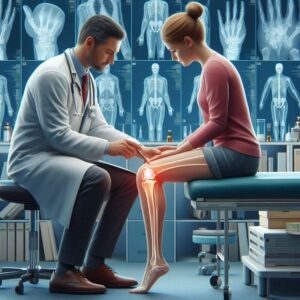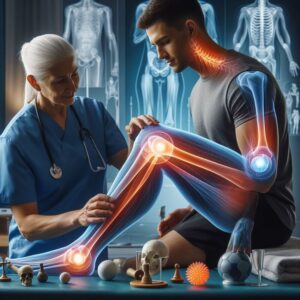Degenerative osteoarthritis affects one-third of the population over time. Knowledge about it is crucial to managing and treating this condition effectively. Discomfort and suffering brought on by degenerative osteoarthritis can have a profound impact on an individual’s standard of living. People who are informed about the disease and its origins, symptoms, and options are more likely to take responsibility for their health and make the most of available resources.
What is Osteoarthritis Degeneration?
Degenerative joint disease, more often known as osteoarthritis, is a condition that can affect the joints of the body. The protective cartilage that encases the ends of bones in a joint degrades and finally wears away. The bones rub against one another due to cartilage wear and tear, which causes irritation, discomfort, and stiffness.
When this condition shows up, the patient’s hips, knees, and spine suffer the most. It can also affect the joints in your hands and feet. Osteoarthritis degeneration often worsens with time if left untreated.

Causes and Risk Factors of Osteoarthritis Degeneration
There are several common causes of osteoarthritis. Significant factors include the wear and pressure on joints caused by ageing. As we age, the cartilage that protects our joints gradually wears away, which may lead to the onset of degenerative osteoarthritis.
Degenerative osteoarthritis can develop for a variety of reasons, including genetics, excess body fat, damage to the joints, or repeated stress injuries. Individuals with particular predisposing characteristics have a higher chance of experiencing it. Having a personal or family history of the illness, being overweight or obese, having a history of joint discomfort or surgery, and using the joints too much from repetitive motions are all factors that increase the likelihood of developing this condition. Motions.
Symptoms of Degenerative Osteoarthritis
| Symptoms | Description |
|---|---|
| Pain | Steady or intermittent pain in the affected joint |
| Stiffness | Difficulty moving the joint, especially after periods of inactivity |
| Tenderness | The joint is sensitive to touch or pressure |
| Swelling | The joint may appear larger than usual due to inflammation |
| Cracking or popping | Audible sounds when moving the joint |
| Decreased range of motion | Difficulty moving the joint through its full range of motion |
| Bone spurs | Bony growths that can develop around the affected joint |
Depending on the extent of joint destruction and the number of affected joints, the symptoms of degenerative osteoarthritis can be mild, moderate, or severe. Many people report diminished mobility, swelling, pain, and joint stiffness. Specific individuals suffering from osteoarthritis may perceive a grating or grinding noise.
These symptoms can greatly impact everyday living. Stiffness or soreness in the joints can make even the simplest tasks, like getting dressed, difficult. Pain and discomfort not only make it difficult to sleep but also negatively impact one’s quality of life in general.
Diagnosis and Tests for Osteoarthritis Degeneration
A review of medical history and a physical examination can diagnose degenerative osteoarthritis. Radiographs or magnetic resonance imaging (MRI) scans can help doctors evaluate the patient’s joint health and identify any underlying issues that could be causing their symptoms.
In some cases, checking joint fluid for signs of inflammation or infection may be necessary. This is accomplished by sending a small fluid sample from the affected joint to a lab for analysis.

Different Types of Degenerative Osteoarthritis
Degenerative osteoarthritis can be grouped into different types depending on the joints that are impacted. Knee osteoarthritis is a common kind of arthritis. One kind impacts the hips, while the other targets the spine.
Osteoarthritis symptoms, indications, and potential therapies might differ significantly. For example, it can make it difficult to move about and cause pain in the knees, while in the back, it can cause stiffness and discomfort.
Treatment Options for Osteoarthritis Degeneration
Numerous effective treatment options exist for osteoarthritis. Treatment goals include reducing discomfort, improving joint function, and halting the course of the illness. Surgery, behavioural changes, medication, exercise, and physical therapy are all potential components of a comprehensive treatment programme.
Treatments for Dementia Knee and joint pain
Medicine can alleviate pain and inflammation in degenerative osteoarthritis. An NSAID, such as ibuprofen or naproxen, helps reduce swelling and discomfort. Paracetamol is an additional option for pain relief.
Corticosteroid injections are occasionally recommended as a temporary fix for inflammation and discomfort. Injecting these drugs directly into the injured joint is standard procedure.
Since any prescription has the potential to have side effects, it is advisable to discuss the benefits and risks of medication with your doctor before starting therapy.
Modifications to Habits for the Control of Ageing Osteoarthritis Discomfort
Some people find relief from the pain of degenerative osteoarthritis by making changes to their lifestyle. For instance, the joints that support your body weight—your knees and hips—are spared more wear and tear when you keep a healthy weight. Incorporating omega-3 fatty acid-rich seafood and almonds into a well-rounded diet is another strategy for reducing inflammation.
One way to improve joint function is to exercise regularly to strengthen the muscles around the affected joints. Swimming, cycling, and walking are low-impact activities usually recommended for people with osteoarthritis. Get the OK from your doctor or PT before starting any new exercise programme.

Physical Therapy and Exercise for Osteoarthritis Degeneration
Physical therapy techniques, specific exercise programmes, and lifestyle changes can better manage degenerative osteoarthritis. Range-of-motion exercises can improve joint flexibility, and strengthening activities can strengthen the affected joint for extra support.
Physical therapy may use ultrasound, electrical stimulation, and heat or cold treatments, among similar methods, to manage pain and improve joint function. A physical therapist may design a personalised therapy plan based on each patient’s specific needs and goals.
Regenerative Surgery: How Often Does Osteoarthritis Occur?
In some cases, surgery may be necessary to treat degenerative osteoarthritis. Surgical alternatives to joint dissection include joint replacement surgery, which involves implanting a prosthetic joint into the damaged joint, and arthroscopy, which involves putting a tiny camera into the joint to remove diseased tissue or rebuild cartilage.
Surgical intervention is an option to explore when other therapeutic options have been exhausted or when the condition significantly impacts everyday functioning. A wise person would talk to their doctor about the pros and cons of surgery before deciding to have it done.
Degenerative osteoarthritis, a typical kind of osteoarthritis, can cause significant discomfort. If informed about the disease and its origins, symptoms, and alternatives, people may take responsibility for their health and make the most of osteoarthritis treatment options. Early diagnosis and therapy can slow the course of degenerative osteoarthritis and improve symptoms and quality of life. As a result, seeking medical help is essential if you’re experiencing any symptoms.
If you want to learn more about effective treatments for degenerative osteoarthritis, you may find this post on plantar fasciitis and identifying remedies helpful. Plantar fasciitis is a common foot ailment with several symptoms of degenerative osteoarthritis, such as inflammation and discomfort. This article provides insightful information on managing these disorders and the many therapeutic options available. Check it out here.
FAQs
What is Degenerative Osteoarthritis?
In degenerative osteoarthritis, the cartilage in the joints gradually deteriorates, leading to joint stiffness, oedema, and discomfort.
What are the symptoms of Degenerative Osteoarthritis?
Degenerative osteoarthritis is characterised by joint stiffness, oedema, discomfort, and reduced mobility. These symptoms might get worse as time passes.
What causes Degenerative Osteoarthritis?
The leading cause of degenerative osteoarthritis is the degradation of joint cartilage. Age, heredity, trauma, and excess body fat are among the variables that might bring about this deterioration.
How is Degenerative Osteoarthritis diagnosed?
Imaging studies like X-rays or MRI scans, a thorough medical history, and a physical examination are usually used to diagnose osteoarthritis.
What are the treatment options for Degenerative Osteoarthritis?
Managing pain, engaging in physical therapy, losing weight, and, in extreme circumstances, surgery are all potential treatments for degenerative osteoarthritis. Administering corticosteroids and nonsteroidal anti-inflammatory medicines (NSAIDs) is also possible.
Can Degenerative Osteoarthritis Be Prevented?
There is no known way to avoid acquiring degenerative osteoarthritis altogether, although measures may be taken to lower the risk. You should do your best to prevent harm to your joints, keep active, and maintain a healthy weight.
References
How Long Do Glucosamine and Chondroitin Take to Work? Fuel Organic Vitamins: https://fuelorganics.com/blogs/learning-center/how-long-do-glucosamine-and-chondroitin-take-to-work
Does arthritis make you tired? | BCR. https://bcr.org/2023/07/24/does-arthritis-make-you-tired/
The Post: Degenerative Osteoarthritis – Understanding the Pain appeared first on MCR Preston.
The Article Pain in Degenerative Osteoarthritis: A Comprehensive Guide appeared first on MCR Therapies.
The Article Pain in Degenerative Osteoarthritis: A Comprehensive Guide Was Found On https://limitsofstrategy.com
The Article Pain in Degenerative Osteoarthritis: A Comprehensive Guide First Appeared ON
: https://ad4sc.com
Comments are closed